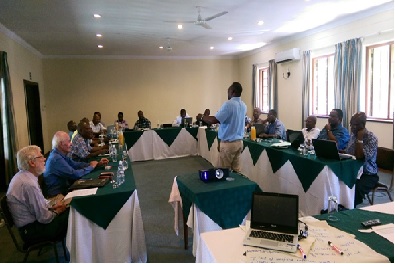The Acting Director of Water from the Ministry of Environment Water and Climate, Mr Gilbert Mawere gave the workshop’s welcome remarks. He emphasized that a book for Water Resources Management in Zimbabwe will give a thrust on how water should be managed in the future. He commended the timing of the initiative as Zimbabwe is currently experiencing a drought. He further on underscored on the importance of mainstreaming gender on such initiatives.
The aim of the meeting was to explore the concept of developing a water resources management book for Zimbabwe and the objectives were to (i) collectively justify the need for writing the book (ii) collectively identify priority thematic areas, (iii) identify key questions to be answered by the chapters. The expected output of the meeting was an outline highlighting the book chapters and preliminary budget which will be used to source for further funding.
Professor Mazvimavi gave the background of the book initiative. In his presentation he highlighted on the presence of a lot of undocumented knowledge about water related issues in Zimbabwe. He emphasized on the need of a culture of documenting experiences, lessons learned and best practices making use of existing collaboration between disciplines. He further pointed out that currently practitioners, researchers and students have difficulties accessing both documented and undocumented information. In presenting on developing an over-arching theme for the book Professor Chimbari reiterated that the intention is not to produce a thesis type of work but a practical book appealing to practitioners but also academically relevant.
Dr Makurira led the discussion on chapters to constitute the book. The following chapters were identified:-
- i. Water and environment
- ii. Climate
- iii. Hydrology
- iv. Groundwater Resources
- v. Water and Agriculture
- vi. Water and Health
- vii. Policy and legislation
- Planning and Management
- ix. Water supply and sanitation
- x. Water and society
- xi. Infrastructure development and management
- xii. Hydroelectric development
- Human Resources Development
- Historical perspectives on water resources management in Zimbabwe?
Participants where then grouped according to their area of expertise to brainstorm on the chapter contents of the suggested chapters. Individual groups selected the lead author of their chapter and the contributing authors. Proffessor Manzungu led the discussion on possible book titles and possible publishers of the book. It was agreed that the society’s expectations on the book, should reflect on the title. Three possible publishers were identified.
Professor Nhapi guided the stakeholder identification exercise and key stakeholders were identified. It was agreed that the stakeholders need to be included from the beginning to the end of the process. During the deliberations it was also agreed that there is need to form a Zimbabwe Water Resources Management Society. Dr Senzanje was tasked with the coordination of this network and Dr Tumbare was tasked with developing a framework of the society.
In mapping the way forward coordinators for the book writing process were identified and deadlines for the development of a concept note for funding, chapter abstracts, zero draft chapters, submission for review, and submission of final draft for publication were set. The outcomes of the workshop were
- Book chapters were identified
- Lead authors and contributors to chapters were identified
- Initiative for the formation of a Water resources management society
